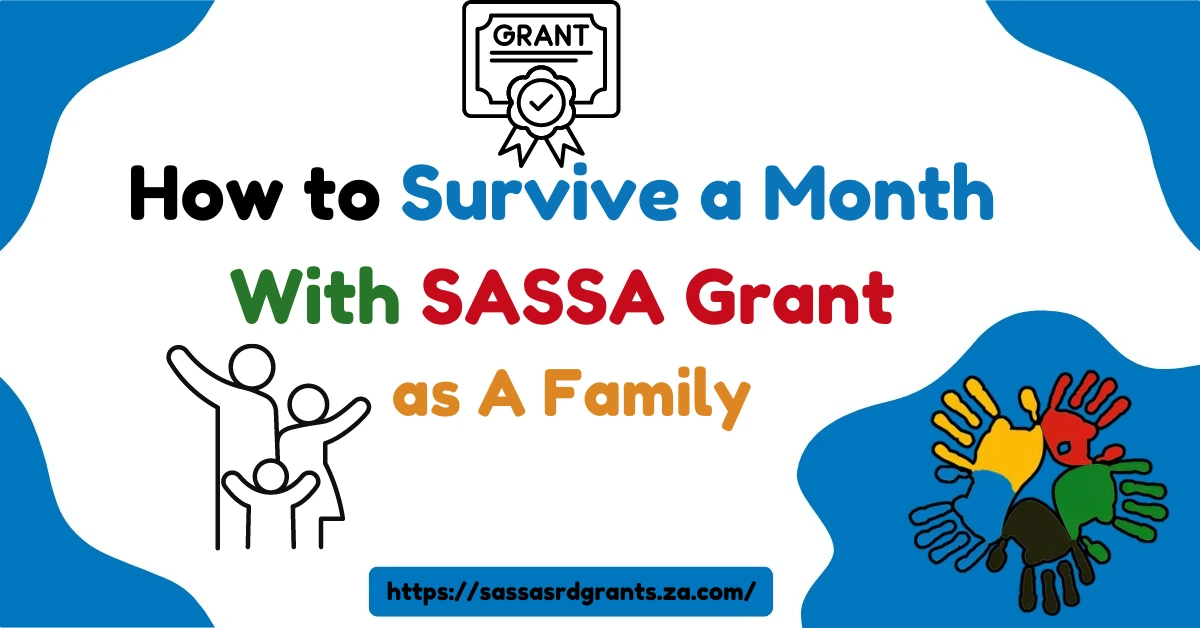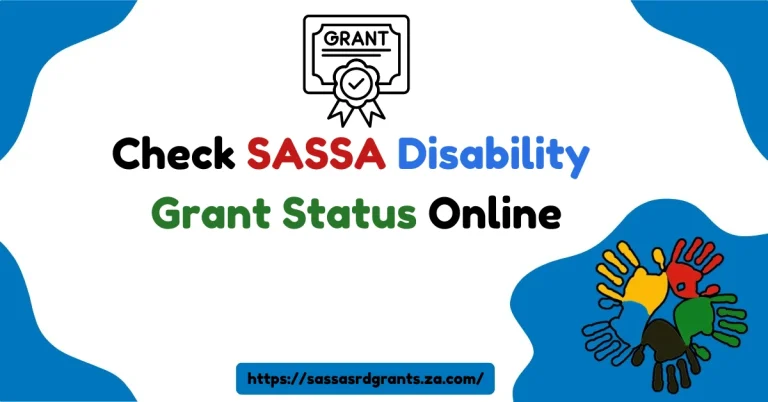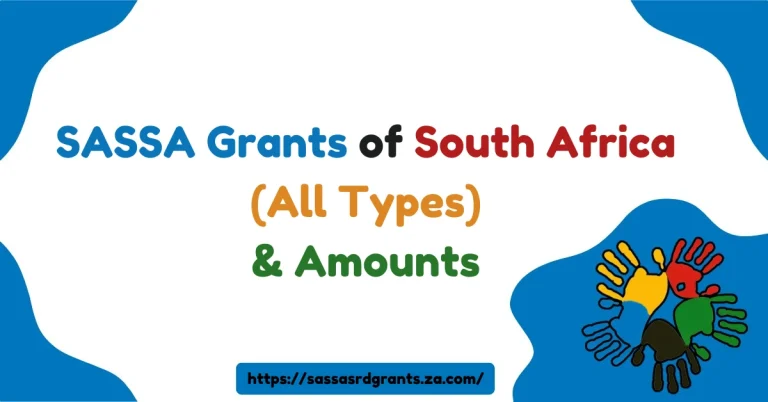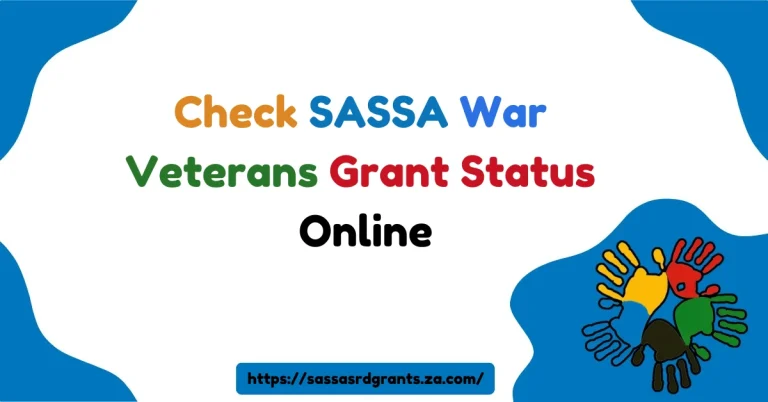How to Survive a Month With SASSA Grant as A Family
Surviving on a limited income, such as a SASSA grant, can be challenging, especially when you are trying to provide for your family. However, with the right strategies, it’s possible to stretch that money and cover all essential needs for an entire month.
In this article, I’ll walk you through a detailed guide on how to manage your household expenses, tips on budgeting, and practical ways to make the most of your SASSA grant.
How to Survive a Month With SASSA Grant as A Family(Quick Answer)
To survive a month with a SASSA grant as a family, create a strict household budget by listing all income and prioritizing essential expenses like food, rent, and utilities. Reduce costs by shopping smartly, cooking at home, and cutting electricity, water, and transportation bills. Seek additional income sources and save for emergencies. Following these steps helps stretch the SASSA grant to cover necessities throughout the month.
Amount of Different SASSA Grants
Before we dive into how to create a budget, it’s essential to know the different types of SASSA grants and how much you can expect to receive. Below is a breakdown of the grant types and their amounts:
| Grant Type | Grant Amount |
|---|---|
| Old Age Grant (60 to 75) | R2,180 |
| Old Age Grant (75 & Above) | R2,200 |
| Disability Grant | R2,180 |
| Child Support Grant | R530 |
| War Veterans Grant | R2,200 |
| Care Dependency Grant | R2,180 |
| Foster Child Grant | R1,180 |
| SRD R370 Grant (Formerly R350) | R370 |
These amounts are relatively small, and managing a household on them can feel like an uphill battle. However, a well-planned budget can help you make ends meet and even save a little for emergencies.
Step-by-Step Guide to Making a Monthly Household Budget
Step 1: List Your Monthly Income
The first thing you need to do is figure out your total monthly income. This includes the SASSA grant, income from any side hustles, or earnings from other family members. Knowing your total income helps you allocate your funds more effectively.
Step 2: Calculate Your Monthly Expenses
Next, jot down all your expected expenses. These fall into two categories: fixed expenses and variable expenses.
- Fixed Expenses: These are consistent each month, such as rent, transportation, electricity, water, and school fees.
- Variable Expenses: These change monthly and include groceries, medical expenses, clothing, and house repairs.
Step 3: Prioritize Your Needs
Once you know your income and expenses, prioritize essential expenses. Focus on paying for food, shelter, utilities, and education first. Your SASSA grant may be your most stable income, so plan around it.
Step 4: Stick to Your Budget
Creating a budget is one thing; sticking to it is another. Track your spending daily and write down every expense. This helps you stay disciplined and prevents unnecessary spending.
Tips to Make Your Monthly Budget Work
A budget is only as good as your ability to follow it. Here are some tried-and-true tips to make it work:
1. Smart Shopping Decisions
Managing shopping expenses can be one of the hardest tasks, but here are a few tips that help reduce costs:
- Buy Only What You Need: Avoid overspending on food or other items that may go to waste. Planning weekly meals helps minimize waste.
- Bulk Buying: Purchase non-perishable items in bulk to take advantage of discounts.
- Shop Smart: Look for stores that offer discounts or have lower prices on essentials.
- Home Cooking: Eating out can be expensive, so try to cook at home as much as possible.
- Grow Your Own Food: If you have space, consider starting a kitchen garden to grow your own fruits and vegetables.
2. Cut Household Expenses
Reducing household costs is key to stretching your SASSA grant. Here’s how:
- Save Electricity: Use energy-saving devices and avoid turning on unnecessary lights or appliances.
- Reduce Water Bills: Fix any leaks and consider collecting rainwater for non-drinking purposes. This can cut your water bill significantly.
- Lower Transportation Costs: Opt for public transport or carpooling. For shorter trips, walking or cycling is both healthy and cost-effective.
- Lower Communication Costs: Use free messaging apps and public Wi-Fi to reduce your phone bill.
3. Manage Healthcare Costs
Healthcare can be a major drain on limited funds. Here are a few tips to help control these expenses:
- Use Public Healthcare: Visit public hospitals and clinics for affordable medical services.
- Consider Health Insurance: If you can afford it, having health insurance can cover unexpected medical expenses.
- Exercise and Eat Healthily: Preventing illness is the best way to avoid healthcare costs. Regular exercise and good hygiene go a long way.
4. Lower Education Costs
If you have children, education expenses can quickly pile up. Here’s how to reduce them:
- Public Schools and Libraries: Enroll your children in public institutions to minimize education-related expenses.
- Scholarships: Apply for government or private scholarships that offer financial assistance.
Seeking Additional Income Sources
While managing your SASSA grant is important, seeking extra income is a surefire way to make things easier. Here are a few ideas:
- Start a Side Hustle: Think of ways to earn extra cash, whether it’s selling items online or offering a service.
- Part-Time Work: If possible, look for part-time jobs to supplement your income.
- Learn New Skills: Acquiring skills that you can monetize online or in your community can help you make ends meet.
Long-Term Financial Planning
Surviving month to month on a SASSA grant is difficult, but you can take steps to improve your situation in the long run:
- Set Financial Goals: Even if it’s a small amount, saving each month can help you in the future.
- Invest in Education: Gaining new skills or certifications could lead to higher-paying jobs or better opportunities.
- Save for Emergencies: Having a financial cushion can prevent crises from derailing your budget.
Frequently Asked Question (FAQ’s) surviving a month with a SASSA grant as a family:
1. What is the SASSA grant amount for different types of recipients?
The SASSA grant varies by recipient type:
- Old Age Grant (60 to 75 years): R2,180
- Old Age Grant (75 & above): R2,200
- Disability Grant: R2,180
- Child Support Grant: R530
- Foster Child Grant: R1,180
- Care Dependency Grant: R2,180
- War Veterans Grant: R2,200
- SRD Grant: R370
2. How can I manage my expenses with a SASSA grant?
To manage your expenses, create a monthly budget by listing your income and prioritizing essential needs like food, rent, and utilities. Cut costs by shopping wisely, reducing household bills, and cooking at home.
3. What are some tips for saving money on groceries with a SASSA grant?
- Buy in bulk for discounts on non-perishable items.
- Plan meals to avoid food waste.
- Purchase from stores offering discounts.
- Cook at home to reduce dining out expenses.
- Consider starting a kitchen garden to grow your own food.
4. How can I reduce household expenses on a SASSA grant?
You can cut household costs by:
- Using energy-saving devices and reducing electricity usage.
- Fixing leaks to reduce water bills.
- Opting for public transport or carpooling.
- Using free messaging apps and public Wi-Fi to lower communication costs.
5. Are there ways to earn extra income while receiving a SASSA grant?
Yes, you can start a side hustle, take on part-time jobs, or learn new skills to sell online, which can supplement your SASSA grant.
6. What should I prioritize when budgeting with a SASSA grant?
Prioritize essential needs like food, shelter, utilities, and education. Allocate your SASSA grant to cover these critical expenses first, and use additional income for non-essential costs like clothing or entertainment.
7. How can I reduce healthcare costs on a limited budget?
Visit public healthcare facilities, consider buying health insurance, maintain regular exercise, and focus on good hygiene to avoid preventable diseases.
Conclusion
Surviving a month on a SASSA grant is no easy feat, but with careful planning, budgeting, and smart decisions, it is possible to make it work. Focus on your essential needs, reduce unnecessary costs, and seek additional income wherever possible. In the long run, setting clear financial goals can help you reduce dependency on grants and improve your family’s financial future. With these strategies, you can make the most of your SASSA grant and provide for your family even with limited resources.





